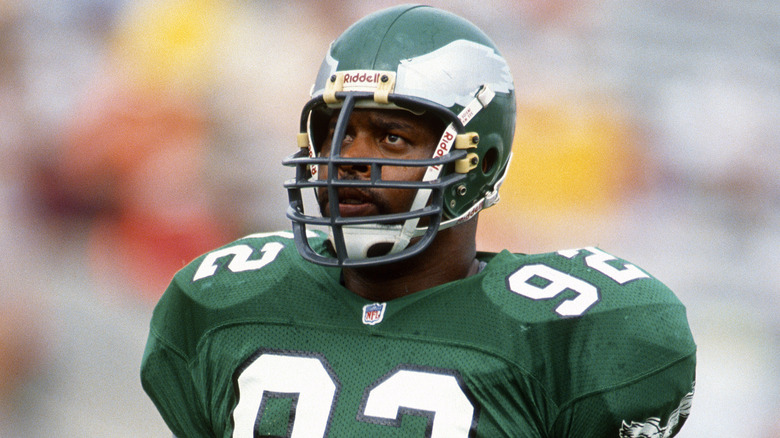Tragic Details Found In Reggie White's Autopsy Report
Reggie White spent his NFL career being a pass rusher who drove through opposing offensive coordinators and linemen week in and week out. Quarterbacks were afraid of being sacked by the 291-lb behemoth. He had an entire repertoire of moves that enabled him to quickly shed people who were in his way and get a path to the quarterback. Entire game plans were constructed around stopping "The Minister of Defense." That moniker was given to him thanks to his deep religious convictions and his position as an ordained Evangelical minister, though "Thou shalt tackle many quarterbacks" is nowhere to be found in the Bible.
White came into the league in 1985 and spent the early part of it in Philadelphia and then went to Green Bay as a heralded free agent. He retired after the '98 season and then came back for one year as a Carolina Panther. Thanks to his staggering total of 198 sacks, per Pro Football Reference, the legendary defensive lineman was inducted in the Pro Football Hall of Fame in 2006, per Britannica. Sadly, it was a posthumous induction: He died in 2004 after being taken to a hospital in North Carolina, per the Baltimore Sun.
The autopsy attributed his death partly to something that is altogether too common among Americans: sleep apnea.
The NFL legend's immense size was dangerous for him off the field
Sleep apnea (via the Mayo Clinic) is when someone stops and restarts breathing over the course of a night. It played a part in the football legend's death. Per Autopsy Files, there were five reasons given by pathologist Dr. J. Michael Sullivan for Reggie White's death. The first was "sarcoidosis with involvement of heart, lungs, and liver." Second was "cardiomegaly with left ventricular concentric hypertrophy." Third was a "history of sleep apnea." Fourth was "moderate coronary atherosclerosis." Fifth was "mild aortic atherosclerosis." The cause of death was stated as "cardiac: pulmonary sarcoidosis."
White did know that he had sleep apnea, and he was given a CPAP to help with his breathing. He didn't like it, though, and refused to wear it (via ResMed). White didn't know that there was another option for sleep apnea — oral appliances, reports Cleveland Clinic. That option could have helped save his life and prevented the problems that ultimately wound up killing him.
Nowadays, White serves as a cautionary tale for people with sleep apnea. His foundation gives CPAP machines to those who need them. By doing that, he is helping save lives.

